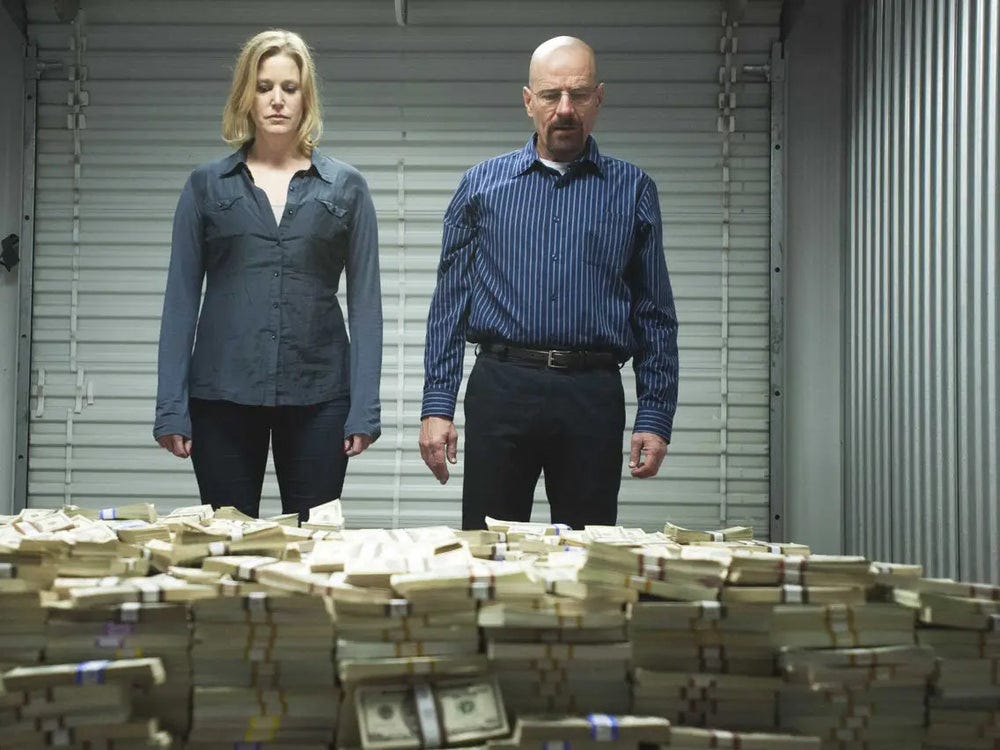If you're so smart, why aren't you rich?
Let's discuss a favorite meme of the FOMO crowd

If you’re so smart, why aren’t you rich? I hear this phrase all the time, so let’s talk about it. It’s the memeification of a modern tension between intellect and wealth, one that wants us to confront an assumption money-obsessed people have: intelligence always should result in riches. Or that being financially rich to an absurd degree is the goal. It’s really no different than people whose life aim is to be the richest guy in the cemetery.
The phrase is less an argument than a meme, meant to provoke FOMO by a crowd who lives and dies by speculation. In reality, a tiny handful of these people are indeed rich, while most believe they will be one day, that just another year on Adderall will get them there, then they can quit and be free. At one point I was actively trading with them, with the goal of making money, sure, but more than that I enjoy puzzles and intellectual challenges. However, I learned it’s a nihilistic game, and there’s better ones to play (even if you like gambling, poker is better, your losses are constrained to the tournament entry cost which is not excessive). I quit trading 2 years ago and am significantly better off mentally (and financially) by dollar cost averaging into index funds. It’s boring and unsexy. But this is definitely a smarter way to get and stay financially healthy. You won’t make as much, but you won’t lose as much either.
"I can calculate the motions of the heavenly bodies, but not the madness of people."
—Sir Isaac Newton, commentary on losing substantial wealth in the 18th century South Sea Trading bubble
Still, the implication some wish to communicate is clear: the smartest among us should be stock market savants, crypto millionaires or sportsbook moneyballers. But this isn’t really how life works. Everyone doesn’t do that. Some of the brightest minds pursue intellectual or creative fields that the market values only as curiosities. What is the dollar value of an original theorem or a beautiful novel? The market doesn’t have a ready answer, which is why authors, philosophers, and physicists often find themselves rich in thought but not cash. Which is why you do need to have a plan, as I’ve written on. The world is indeed a brutal and uncaring place.
I think something else is also lost on many here: that not everyone views wealth as the ultimate scoreboard. There’s a quiet rebellion in the act of having ‘enough.’ Enough to pay rent or mortgage, enough to enjoy a quiet dinner with loved ones, enough to pursue a life that aligns with their values. The pursuit of ever more filled with Lamborghinis, champagne-fueled yacht parties etc is less a marker of success and instead mostly an overcompensation for a lack of personality or character. These people ultimately find themselves on a hedonic treadmill, sprinting toward the next acquisition or thing to flex on Instagram without realizing the treadmill doesn’t stop. It’s similar behavior as an alcoholic or drug addict.
Kurt Vonnegut and fellow writer Joseph Heller (author of Catch-22) were at a lavish party hosted by a billionaire on Shelter Island. Vonnegut teased Heller, noting that their host likely made more money in a single day than Heller had earned from his wildly successful novel over its entire lifetime. Heller responded:
"Yes, but I have something he will never have."
Vonnegut asked, "What?"
Heller replied, "The knowledge that I’ve got enough."
This idea of enough feels increasingly alien, especially to younger generations grappling with the dual weights of nihilism and hyper-capitalism. They’ve grown up in a digital hall of mirrors, where influencers flaunt impossibly curated lives, where worth is measured in likes, views, and speculative fortunes. The result is a youth culture that’s simultaneously disillusioned and money-obsessed, certain that wealth is the only way out of a system they see as rigged.
But what is ‘out,’ exactly? The fantasy of ‘exit’ is now common: retiring at 28, trading your way to millions, fleeing normalcy for a life of luxury. This fantasy masks a deeper loss, an inability to envision a life that’s good without being extravagant, or simply one you don’t have to run away from. True wealth lies not in escape but in presence: being in shape and having enough time to climb a hill and enjoy the view, having friends and family who laugh at your jokes, doing work that directly creates real things, developing skills that mean something. These are riches that compound in ways no bank account can.
So if you’re so smart, why aren’t you rich? Because you’ve realized that the smarter question is, ‘what’s rich, really?’ If all you’re chasing is money, you might find yourself rich in digits but impoverished in spirit. A good life isn’t about some sort of exit, it’s about actively being part of the world, making art, being with other people, not living like a degenerate addict. You don’t need infinite money for this. Just figure out what, for you, is enough.



I was in a sketch writing class in LA. Teacher was great. We were talking Lou Reed. Couple of folks in the class thought Reed was a brilliant songwriter, as did the teacher. We were all young writers, so the idea of success was always top of mind. Someone asked, "If Lou Reed is so great, how come he's not more famous?" And the teacher said, "Lou Reed is as famous as Lou Reed needs to be." I remember nothing else from that class, but I remember that.
Cracked this one into the cheap seats Adam, loved this!